- Home
- Richard Lee Byers
The Haunted Lands: Book III - Unholy Page 20
The Haunted Lands: Book III - Unholy Read online
Page 20
To the Abyss with this, Toriak thought. He drew breath to order his mount to attack, shifted his grip on his saddle to use it as a shield against the officer’s arrow, and then a huge shape emerged from the gloom at Gaedynn’s back. Toriak hadn’t noticed its approach because, unlike the other griffons, it was black as the night, except for eyes like lambent drops of blood.
Jet screeched, a cry like an eagle’s scream with an undertone of leonine roar. The other griffons shrank back before the leader of their pride, then slunk away from their human masters.
“Now,” said Gaedynn, “it appears to be two griffons and me against the four of you. Still like your chances? If not, I’d scurry back to camp before Aoth comes to find out what stirred up his familiar.”
Gaedynn watched the would-be deserters until he was sure they actually were returning to camp. Then he scratched Eider’s feathery neck and told her she could go back to sleep. The griffon grunted, shook out her wings with a snap that would have knocked him staggering if he hadn’t seen it coming and stepped back, then lay back down in the dewy grass.
Gaedynn turned to Jet. “Thanks for backing me up,” he said.
“Glad to,” the familiar rasped. “Do you think more men will try to leave?”
“I hope not. With luck, those four will warn other malcontents that we’re alert to the possibility. And speaking of them, I need another favor. Please don’t tell Aoth they sneaked out here tonight.”
“You don’t want them punished?”
“They’re good soldiers. It’s just that they know we’re in a tough spot, and they had a little crisis of confidence, possibly exacerbated by strong drink plundered from the Dread Ring’s cellars. They’ll rediscover their nerve in the morning. Besides, I have my own reputation to consider.”
Jet cocked his aquiline head. “Your reputation for not caring about anyone but yourself?”
Gaedynn grinned. “Unkindly put! But something like that.”
A chunk of rock and soil supporting a single pine tree floated just west of the Lapendrar, one of many such islets in the sky, raised by the Spellplague. It commanded a view of Anhaurz, so Khouryn and Aoth landed their griffons on top of it, dismounted, walked to the dropoff, and surveyed the city.
Khouryn reflected that despite the distance, Aoth’s luminous sapphire eyes no doubt made out every detail with utter clarity. Squinting, Khouryn had a harder time of it but fancied he was seeing enough to draw conclusions.
After a time, Aoth said, “It didn’t always look like that, but then, I remember hearing that the blue fire destroyed it. It’s been completely rebuilt since then.”
Khouryn dug his fingers into his beard to scratch an itch on his chin. “The question is, why? The civil war was over, and while this town commands the river crossing, it’s also well inland from the edge of the realm. To say the least, the average lord wouldn’t fortify it to the extent that this one—or his predecessor—has.”
“Then I gather you wouldn’t relish laying siege to the place.”
Khouryn snorted. “You gather rightly. The bridge amounts to a castle by itself, and combined with the rest, it’s as bad as the Dread Ring. Maybe worse.” He grinned. “In other words, it’s perfect!”
Aoth grinned back. “It’s so strong that turning away from it won’t call into question our resolve to reach the Ring in Tyraturos. We’ll head southwest down the Lapendrar—for after all, the other direction would take us dangerously close to the Keep of Sorrows—looking for a place to ford.”
“Which we won’t find,” Khouryn said, “because the spring thaw and the spring rains have swollen the river. Actually, we’ll be headed toward the border even though it will look like we’re still trying to march deeper into the country.”
“Not bad, eh? We might actually make it out of Thay with a company left to lead.”
“As long as the bard and the ghost succeed at their task, and then everything else works out. As long as we aren’t still diddling around taking in our surroundings when Szass Tam sends forth his tides of death.”
Aoth’s smile turned wry and crooked. “You know, for a moment there, I actually felt my spirits lift.”
Even in Szass Tam’s own city, where his undead minions were ubiquitous and the living scurried like mice to make way for them, there were rebels, and Arizima Nathandem was their leader. In her youth, the Red Wizards had taken her as an apprentice, until a training exercise gone awry left her with a persistent stammer and the inability to recite spells with the requisite precision. Then they’d cast her out as a useless cripple.
At first agreeing with that judgment, she’d fallen a long way, her Mulan blood notwithstanding. She’d landed in a festhall and still worked there today, though age had long since wrinkled her face, whitened her hair, and stained some of her teeth and outright stolen the rest. Now she managed the house, and it served the rebel cause admirably. No one questioned it when people of all stripes came and went at any hour of the day or night.
She conducted Bareris and Mirror into a sort of mock torture chamber, equipped with soft leather whips, switches, blindfolds, gags, and restraints, but no implements likely to inflict permanent harm. Just toys to amuse a Thayan noble bored with ordinary forms of sexual congress.
Arizima sat down stiffly on the bed. “It’s b-been a … long time,” she said.
“Your circle wasn’t fighting,” Bareris replied. “Our time was better spent elsewhere.”
The old woman scowled. “We sp-spy. We can’t do anything more, not here at the heart of it all, or Szass … Tam’s agents will swoop down on us like hawks!”
Mirror, who currently resembled a blood orc they’d passed in the street, inclined his head. “We understand that, Lady. My brother meant no offense.”
Arizima cackled. “‘Lady,’ is it? You’d think the b-bard would be the one with the golden tongue.”
“You lead a band of our comrades,” the phantom replied. “That makes you a knight, or as good as, in my eyes.”
“Thank you,” she said. “That’s kind. Now, why have you … returned, and how can we help you?”
“Help us find a way into the Citadel,” said Bareris, “so we can destroy Szass Tam.”
Arizima peered at him as though looking for some sign that he was joking.
“I mean it,” Bareris said, and, as clearly and convincingly as he could, he explained the lich’s scheme and what he and his comrades intended to do about it.
By the time he finished, the old woman was shaking her head. “Tear down this world and put up a new one with himself as the only god? That’s madness!”
“I agree,” Bareris answered, “but the trouble is that it truly does seem like Szass Tam’s particular flavor of madness. And while the zulkirs of the council doubt the ritual will accomplish its goals, they do believe it may well devastate Thay and neighboring lands.”
“So after all our years of hoping and praying and trying to nibble away at the necromancers’ reign, it’s now or never.”
“Yes. But the good part is that if our plan works, we’ll have four archmages popping out at the lich to attack him by surprise. That’s never happened before. The zulkirs were never willing to bet everything on this sort of gamble.”
“All right,” Arizima said. “I under … st-stand, and I want to help. I just don’t know if I can. We’ve watched the fortress for decades, but the more you look, the more discouraged you become.”
“I assume that it’s still impossible for a mage to translate himself inside.”
“Yes. I’ve seen demons try. They appear in midair looking like they ran headfirst into a wall.”
“But what if I were to disguise myself with magic?”
“It won’t work. There are wards to strip away illusions and shrouds of invisibility.”
“Then what if I just walk in as though I have legitimate business inside? I don’t look all that different from many other undead. I have the proper uniform and that ‘golden tongue’ you spoke of. And after all,
it is the regent’s palace. There must be people coming and going all the time.”
“All the d-d-doorkeepers are undead, so you’d have trouble making your blandishments work on them. And if you did persuade them, they’d assign an escort to take you where you c-claimed you wanted to go.”
“Curse it.” At the periphery of Bareris’s vision stood an X-shaped wooden stand with shackles to hold a prisoner’s wrists and ankles, and he had to resist a sudden urge to turn and give it a kick. Hoping it would calm him, he took a breath instead. “Very well, if neither magic nor pure brazenness will serve, that leaves skulking and climbing.”
“Yes,” Mirror said, “but not for you. Not yet.”
Bareris frowned. “What are you talking about?”
“I can fly,” said the ghost. The tusks and snout of the orc melted away, and his face became a murky semblance of the melancholy, mustachioed one he’d worn in life. “I have innate abilities to walk through walls and fade from view that Szass Tam’s defenses may not affect, or at least, not as strongly as they’d cancel out a sorcerer’s tricks. If things go wrong, I’ll have a better chance of getting away. So let me try to slip inside by myself, and if I succeed, we’ll both go in tomorrow night.”
Bareris didn’t like it. Now that they’d come this far, now that Szass Tam was only a mile away, the urge to press on burned like a fever inside him. But he couldn’t deny that Mirror’s idea made sense.
In the dark, the Citadel loomed like a bizarre, multi-bladed weapon raised to gut the moon. Like any castle worthy of the name, it stood at the center of a patch of open ground and had sentries patrolling the battlements.
Peering from between two of the buildings nearest to the fortress, Mirror watched the guards and timed them as they made their circuits. When he understood the routine, he waited for a gaunt, yellow-eyed dread warrior to trudge by, then darted forward.
He didn’t advance invisibly, because even if such a trick would work for him, it wouldn’t for Bareris. So he sneaked as he had in life when creeping up on an enemy. He stayed low, kept to the deepest shadows, and reached the foot of the outermost wall without incident.
He inspected the huge granite blocks and the mortared chinks between them. He doubted that an ordinary climber could scale the vertical surface unless possessed of exceptional skill. Not quickly enough, at any rate. Bareris, however, was inhumanly strong, remarkably agile, and knew charms to make himself stronger and more nimble still. Mirror judged that his friend could make it.
That meant it was time for him to do the same, before the next guard came tramping along. Alternately checking to make sure the minimal hand- and toeholds didn’t run out and watching the crenellated wall-walk overhead, he floated upward.
With his head at merlon-height, he took another wary look around. This section of the battlements was still clear and, according to his estimation, should remain so for a little while longer. He rose until his feet were at the level of the walkway, then stepped through a crenel onto the ledge.
It was conceivable that if Bareris made it only this far, he could help Aoth, Nevron, and the others translate themselves into the Citadel. But the bard doubted it, and based on all that the past hundred years had taught Mirror about Szass Tam’s wiles, he was inclined to agree. They assumed they’d need to cross the courtyard below, get past the inner wall, traverse a second bailey, and slip inside the towering central keep itself to have any hope of success.
Onward, then. Mirror took a step toward the inner edge of the walkway—since Bareris knew a charm to drift down to the ground unharmed, the ghost didn’t need to bother with finding stairs, either—and a sudden jolt of pain froze him in place. At the same instant, pale light shined from the stones beneath his feet.
From the corner of his eye, he could just make out the crimson glyph that had appeared on the wall-walk three paces to his left. For a moment, he had a childish feeling that what had befallen him was unfair, because he hadn’t actually stepped on the then-invisible sigil and wouldn’t have expected it to affect a non-corporeal entity in any case. But he supposed that his predicament too, was an example of Szass Tam’s cunning.
He strained to move, but paralysis held him fast. He silently called out to the god whose name he had never remembered but whom he nonetheless adored, and tried again. He took a tiny, lurching step, then a bigger one, and then the clenched, locked feeling fell away.
But at the same instant, figures as shadowy and poisonous as himself surrounded him. Perhaps the necromancers kept the murks, as such undead were called, caged inside the wall, or maybe the flare of light had drawn them; focused on breaking free of his immobility, Mirror had missed the moment of their advent. Before he could come on guard, the spirits scrabbled at him with long, wispy fingers, their weightless essence raking through his.
The attacks caused no pain in the physical sense, but they did something worse. Confusion and fear surged through his mind and threatened to drown coherent thought. Every day he struggled for clarity and purpose, for identity itself, and now the murks were clawing them to shreds.
He called to his deity a second time, and for an instant, his shadow-sword blazed with golden radiance. The murks withered away to nothing. Since they and he were made of the same unnatural foulness, the glow could just as easily have slain him as well, but it didn’t. He’d learned to direct it, or perhaps it was simply the god’s grace that enabled him to do so.
Something stabbed him in the back. He turned to see a corpse at the top of the stairs he hadn’t bothered to locate before. The gaunt thing wore a mage’s robe, and its sunken eyes glowed. Tattooed runes covered the exposed portions of its gray, rotting skin.
Mirror’s mind still seemed to grind like a damaged mechanism. It look him an instant to recognize the thing as a deathlock, an undead wizard less formidable than a lich but troublesome enough. And the spells inked into its body would give it additional power.
The deathlock extended its hand, and darts of ice hurtled from its long, jagged nails. Mirror tried to block them with his shield but moved too sluggishly. Fortunately, the attack, magical though it was, passed harmlessly though his spectral body.
He charged the undead sorcerer before it could try again. He cut it and cut it until it tumbled back down the stairs …
Where it collided into the foremost of the blood orcs who were rushing up. Other figures were hurrying along the battlements. Atop one of the lesser keeps, a horn blew.
Plainly, it would be suicide to continue forward. Willing himself as invisible and intangible as possible—as close to utter emptiness as he dared—Mirror whirled, leaped off the wall, and sprinted back the way he’d come.
He didn’t know how to tell Bareris their scheme was impossible. For warriors of his forgotten brotherhood, it was shameful to say such things; it was an article of faith with them that righteousness would always find a way. But he didn’t know what else to say.
chapter twelve
11–18 Kythorn, The Year of the Dark Circle (1478 DR)
Bareris reached for the handle of the tavern door, then faltered.
He scowled at his own foolishness. Why should he feel timid about a trifle like this when he’d spent the past hundred years battling the worst horrors the necromancers could create? But perhaps that was the point. He was accustomed to war and vileness, whereas he’d long since abandoned the practice of entertaining, and he had no idea whether time, sorrow, and the passage into undeath had left the knack intact.
But he had to try. In the wake of Mirror’s failure to penetrate the Citadel, it was the only idea that either he or the phantom had left. And so, masked in the appearance of a dark-haired little Rashemi, wishing he’d sung when Aoth and then the ghost asked him to—it might have knocked some of the rust off—he entered the ramshackle wooden building with the four hawks painted on its sign.
The common room was crowded. He’d hoped it would be, but now the size of the audience ratcheted up his anxiety another notch. The yarting, a musica
l instrument that Arizima had procured for him, made his intentions plain, and the buzz of conversation faded as he carried the instrument to the little platform where, no doubt, other minstrels had performed before him.
Nervous though he was, he remembered to set his upturned cap on the floor to catch coins. He tuned the yarting’s six silk strings, then started to sing “Down, Down to Northkeep.”
To his own critical ear, he didn’t sing or play it particularly well, and since he hadn’t practiced it in a century, he supposed it was no wonder. But when he finished, his audience applauded, cheered, and called out requests. Somebody wanted “Barley and Grapes,” a tune he’d often performed during his years abroad, so he gave them that one next. And thought it sounded a little better.
The third song was better still. The glib banter—joking with the men, flirting with the women—came back more slowly than the music, but eventually it started to flow as well.
He sang sad songs and funny ones. Ballads of love, war, ribaldry, and loss. Memories of a Thay of green fields and blue skies, of cheer and abundance. And as the music visibly touched his audience, he found to his surprise that it moved him too.
Not to happiness. He was done with that. But to an awareness of something besides the urge for vengeance, in the same way that being with Aoth or Mirror occasionally could. And in that awareness was the suggestion of ease, a tiny diminution of the pressure that drove him ever onward.
I could have had this all along, he thought. Why didn’t I?
Because hatred was his sword, and he had to keep it sharp.
Besides, even a hint of solace felt like a betrayal of Tammith’s memory.
Still, perhaps it wasn’t entirely unforgivable to appreciate this interlude as he’d appreciated riding a griffon again, and for the same reason. Because it was almost certainly the last time.
Before he was done, he even gave them Tammith’s favorite, the tale of the starfish who aspired to be a star. His eyes ached, but undeath had robbed him of the capacity for tears, and no one had cause to wonder why a comical ditty would make him cry.

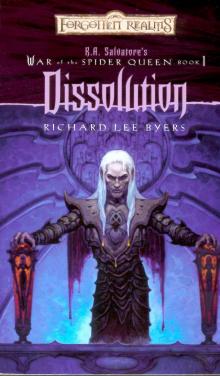 Dissolution
Dissolution Arkham Horror- Ire of the Void
Arkham Horror- Ire of the Void The Haunted Lands: Book II - Undead
The Haunted Lands: Book II - Undead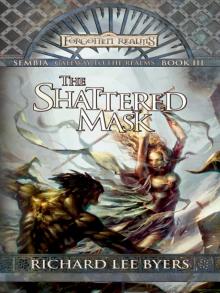 The Shattered Mask
The Shattered Mask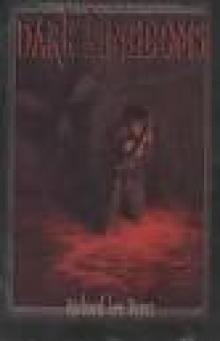 Dark Kingdoms
Dark Kingdoms The Masked Witches: Brotherhood of the Griffon, Book IV
The Masked Witches: Brotherhood of the Griffon, Book IV The Plague Knight and Other Stories
The Plague Knight and Other Stories Unclean: The Haunted Lands
Unclean: The Haunted Lands The Captive Flame: Brotherhood of the Griffon • Book 1
The Captive Flame: Brotherhood of the Griffon • Book 1 The Taste of Waterfruit and Other Stories (Story Portals)
The Taste of Waterfruit and Other Stories (Story Portals) The masked witches botg-4
The masked witches botg-4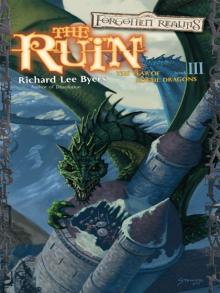 The Ruin
The Ruin The Spectral Blaze botg-3
The Spectral Blaze botg-3 The Masked Witches
The Masked Witches Blind God's bluff bf-1
Blind God's bluff bf-1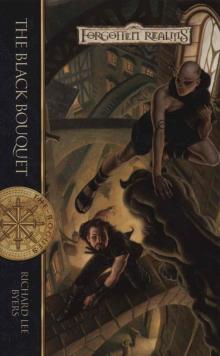 The Black Bouquet r-2
The Black Bouquet r-2 The Rite
The Rite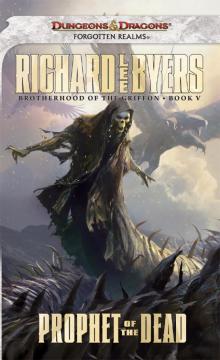 Prophet of the Dead: Forgotten Realms
Prophet of the Dead: Forgotten Realms The Shattered Mask s-3
The Shattered Mask s-3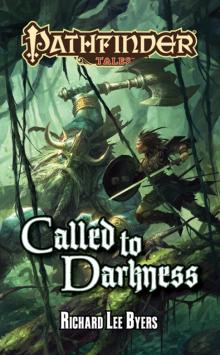 Called to Darkness
Called to Darkness Undead hl-2
Undead hl-2 Blind God's Bluff: A Billy Fox Novel
Blind God's Bluff: A Billy Fox Novel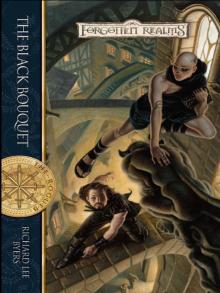 The Black Bouquet
The Black Bouquet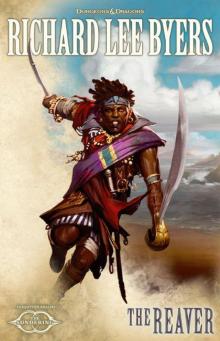 The Reaver
The Reaver The Spectral Blaze: A Forgotten Realms Novel
The Spectral Blaze: A Forgotten Realms Novel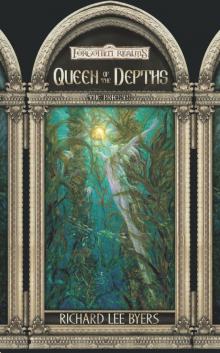 Queen of the Depths
Queen of the Depths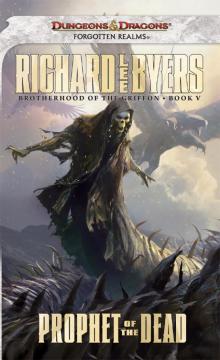 Prophet of the Dead botg-5
Prophet of the Dead botg-5 Whisper of Venom: Brotherhood of the Griffon, Book II
Whisper of Venom: Brotherhood of the Griffon, Book II The Captive Flame botg-1
The Captive Flame botg-1 The Haunted Lands: Book III - Unholy
The Haunted Lands: Book III - Unholy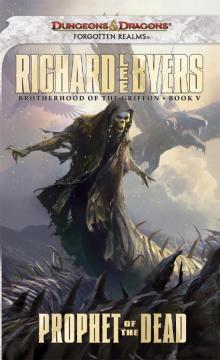 Prophet of the Dead
Prophet of the Dead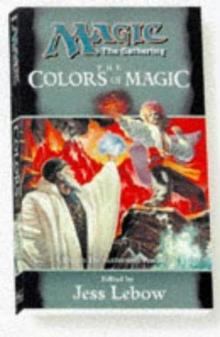 The Colors of Magic Anthology (magic: the gathering)
The Colors of Magic Anthology (magic: the gathering) Unholy hl-3
Unholy hl-3 Unclean hl-1
Unclean hl-1 Blind God's Bluff
Blind God's Bluff Whisper of Venom botg-2
Whisper of Venom botg-2 The Spectral Blaze
The Spectral Blaze